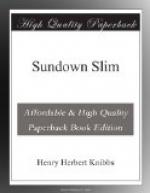Far to the east, where the mesas sloped gently to the hills, grazed the sheep, some twenty bands of a thousand each, and each band guarded and cared for by a herder and an assistant who cooked and at times journeyed with the lazy burros to and from the hacienda for supplies and provisions.
David Loring, erstwhile plainsman and scout, had drifted in the early days from New Mexico to Arizona with his small band of sheep, and settled in the valley of the Concho. He had been tolerated by the cattle-men, as his flock was but a speck on the limitless mesas. As his holdings increased, the ranchers awakened to the fact that he had come to stay and that some boundary must be established to protect their grazing. The Concho River was chosen as the dividing line, which would have been well enough had Loring been a party to the agreement. But he declined to recognize any boundary. The cattle-men felt that they had given him fair warning in naming the Concho as the line of demarcation. He, in turn, considered that his right to graze his sheep on any part or all of the free range had not been circumscribed.
His neighbor—if cattle-men and sheep-men may under any circumstances be termed neighbors—was John Corliss. The Corliss rancho was just across the river opposite the Loring homestead. After the death of their parents the Corliss boys, John and his younger brother Will, had been constant visitors at the sheep-man’s home, both of them enjoying the vivacious companionship of Eleanor Loring, and each, in his way, in love with the girl. Eventually the younger brother disappeared without any apparent reason. Then it was that John Corliss’s visits to the Loring rancho became less frequent and the friendliness which had existed between the rival ranches became a kind of tolerant acquaintanceship, as that of neighbors who have nothing in common save the back fence.
Fernando, the oldest herder in Loring’s employ, stood shading his eyes from the glare of noon as he gazed toward the distant rancho. His son was with the flock and the old man had just risen from preparing the noon meal. “The Senorita,” he murmured, and his swart features were lighted by a wrinkled smile. He stepped to his tent, whipped a gay bandanna from his blankets and knotted it about his lean throat. Then he took off his hat, gazing at it speculatively. It was beyond reconstruction as to definite shape, so he tossed it to the ground, ran his fingers through his silver-streaked hair, and stepped out to await his Senorita’s arrival.
The sunlight flashed on silver spur and bit as the black-and-white pinto “Challenge” swept across the mesa toward the sheep-camp. Into the camp he flung, fretting at the curb and pivoting. His rider, Eleanor Loring, about to dismount, spoke to him sharply. Still he continued to pivot uneasily. “Morning, Fernando! Challenge is fussy this morning. I’ll be right back!” And she disciplined Challenge with bit and spur,




